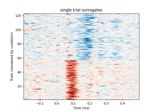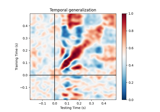mne.decoding.EMS¶
- class mne.decoding.EMS[source]¶
Transformer to compute event-matched spatial filters.
This version of EMS 1 operates on the entire time course. No time window needs to be specified. The result is a spatial filter at each time point and a corresponding time course. Intuitively, the result gives the similarity between the filter at each time point and the data vector (sensors) at that time point.
Note
EMS only works for binary classification.
References
- 1
Aaron Schurger, Sebastien Marti, and Stanislas Dehaene. Reducing multi-sensor data to a single time course that reveals experimental effects. BMC Neuroscience, 2013. doi:10.1186/1471-2202-14-122.
- Attributes
Methods
__hash__(/)Return hash(self).
fit(X, y)Fit the spatial filters.
fit_transform(X[, y])Fit to data, then transform it.
get_params([deep])Get the estimator params.
set_params(**params)Set parameters (mimics sklearn API).
transform(X)Transform the data by the spatial filters.
- fit(X, y)[source]¶
Fit the spatial filters.
- Parameters
- Returns
- selfinstance of
EMS Returns self.
- selfinstance of
Examples using
fit:
- fit_transform(X, y=None, **fit_params)[source]¶
Fit to data, then transform it.
Fits transformer to X and y with optional parameters fit_params and returns a transformed version of X.

